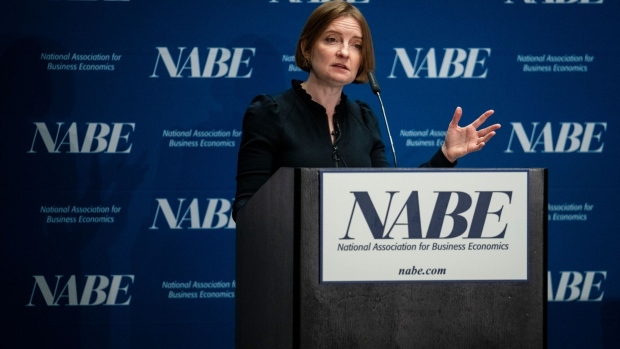Apr 16, 2024
BOE’s Lombardelli Says Rate Cuts Are the ‘Direction of Travel’
, Bloomberg News

(Bloomberg) -- Clare Lombardelli, who is due to join the Bank of England on July 1 as deputy governor for monetary policy, said the “direction of travel” is for interest-rate cuts but that wage growth remains high despite recent signs of a slowdown.
Testifying to lawmakers on Tuesday, the incoming member of the Monetary Policy Committee declined to say when she expects the BOE to begin easing policy.
“I’m not going to put a date on when I expect the UK to start the process of loosening monetary policy, but it clearly is the case that that will be the direction of travel for certainly for European economies,” she told the House of Commons Treasury Committee. “That’s what we would expect.”
Lombardelli, the chief economist at the OECD, joins the UK central bank at a critical juncture as policymakers weigh a pivot toward cutting interest rates for the first time since inflation surged and an overhaul to its forecasting methods after criticism that it was too slow to respond to double-digit price growth.
She will cast her first vote when the MPC meets in August. Markets see a strong possibility of a cut from the current 16-year high of 5.25% in that month and are fully pricing in a reduction by September.
In written evidence to the cross-party Treasury Committee, Lombardelli said the downward path of inflation is likely to be “bumpy,” with the headline gauge expected to fall more quickly than services inflation.
“The risks for the UK are similar to those of other advanced economies. On the one hand inflation, especially services inflation, may prove to be more persistent than expected. This could be the case if firms are confident of their ability to raise prices and labor markets remain relatively tight. In this case the monetary tightening to date may have less effect on bringing down inflation than expected.
“On the other hand, it is uncertain how much of the impact of the monetary tightening has fed through to the economy, for example as mortgage holders roll off previously low fixed rate mortgages. As inflation falls the policy rate will be more restrictive in real terms and so the impact of monetary tightening on demand may prove to be greater.
“Navigating policy through this uncertainty is the key challenge for bringing inflation back to target sustainably and for growth in the near term.”
Lombardelli’s appointment hearing also covered shifting fortunes in the global economy and criticism of the BOE:
- She said that the US and European economies and their interest rate outlooks have diverged in recent months, noting that markets expect borrowing costs to fall first in the latter.
- Lombardelli promised a shake-up of the BOE’s forecasts and communications following Ben Bernanke’s review, saying there were “large errors” in central bank projections across the world.
- She dismissed accusations of a ‘Treasury takeover’ at the BOE after her appointment only shortly after she left the government department. She added that the MPC is designed to have diversity of thought and outside experience.
- She said that the impact of Brexit is still hard to “disentangle” from the effects of a series of shocks to the global economy in recent years.
Her written comments pre-date Tuesday’s labor market statistics that show unemployment rose more than expected but that regular wage growth remained stubbornly high, easing to just 6% from 6.1% — well above the 3% deemed sustainable by the BOE.
“Wage growth is slowing; however it remains high,” Lombardelli wrote.
(Updates with comment from the hearing.)
©2024 Bloomberg L.P.






